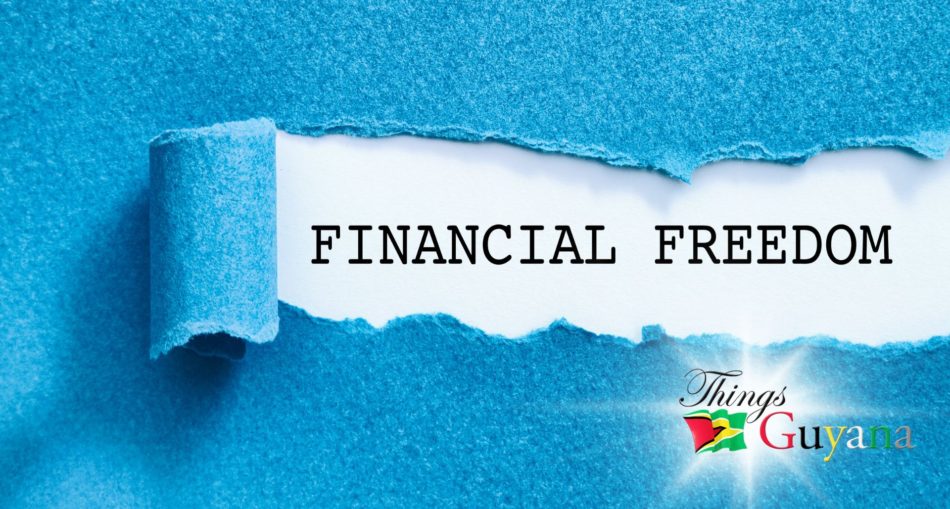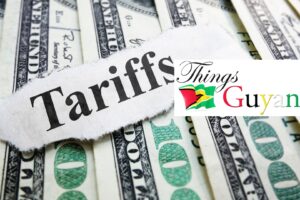Financial freedom refers to the state of having enough wealth and income to support one’s lifestyle and financial goals without having to rely on traditional employment. It means having the ability to make choices about how to spend one’s time and resources without being constrained by financial limitations.
Guyana is a post-colonial state and like most post-colonial states, we are still under the influence of some colonial-type thinking. That is, we go to school for the first 15 years of our life, get a job and stay at it for the next 45 years, and then we retire. During this time, depending on multiple factors (earning capacity, free time, etc.), we are restricted in our way of life to the requirements of the job. The majority of people that find themselves in this trap never really get to enjoy life, let alone financial freedom. A paradigm shift is necessary for us to think and live differently – in a way congruent with our passion and not in the way that we are conditioned to live. In a world driven by capitalism, financial freedom is necessary to break the chains of bondage.
Achieving financial freedom typically involves creating multiple streams of income, reducing expenses, and investing wisely. It often requires a combination of saving, investing, and earning more money.
Some of the benefits of achieving financial freedom include:
More flexibility and control over one’s time:
Financial freedom allows you to pursue your passions and interests without being tied to a traditional job. This could mean having the time to do the things you dream of, like joining the gym or a club or pursuing a new hobby. Additionally, financial freedom can give you the ability to make choices about how to use your time and resources, which can improve your overall sense of control and well-being.
Reduced stress and anxiety:
Not having to worry about money can greatly reduce stress and anxiety in one’s life. Worrying about income to pay for living expenses is a root cause of stress. Financial freedom can help reduce stress because it provides a sense of security and stability. When you have enough money to cover your basic needs and have some savings set aside for unexpected expenses, you are less likely to worry about how you will pay for things. When you don’t have to worry about money, you can focus on other aspects of your life such as family, friends, hobbies, and personal growth.
Greater ability to take risks:
Financial freedom can give you the freedom to take risks and pursue new opportunities without being constrained by financial limitations. Financial freedom can allow you to take risks because it provides a cushion of savings and assets that can help you weather unexpected financial challenges. When you have a solid financial foundation, you can afford to take risks in your career or business without worrying about how you will pay your bills if things don’t go as planned. Financial freedom also allows you to invest in opportunities, such as starting a business or investing in real estate, that might not be possible otherwise.
More options for retirement:
Having enough wealth and income can provide more options for retirement and the ability to live comfortably in one’s later years.
Financial freedom and retirement are closely related in that both involve having enough money saved and invested to support your lifestyle without needing to work. Financial freedom can be achieved at any point in your life, whereas retirement is typically associated with the end of your working years.
In order to achieve financial freedom and retire comfortably, it’s important to start saving and investing early. This allows your money to grow over time and compound interest. Additionally, it’s important to have a clear understanding of your expenses and income, and to create a budget that allows you to save and invest a significant portion of your income.
Retirement planning also involves understanding how much money you will need to save in order to maintain your standard of living during retirement, and how to invest your savings so that they will grow over time. Additionally, it’s important to consider any sources of income you will have in retirement, such as Social Security or pension benefits.
Ultimately, achieving financial freedom and retirement requires a combination of saving, investing, and planning. The earlier you start, the more time your money has to grow, and the more options you will have in retirement.
More freedom to help others:
Financial freedom can also allow you to give back to your community and support causes that you care about.
Financial freedom can allow you to give back to your community in a variety of ways. When you have a solid financial foundation and are able to meet your basic needs, you have the ability to share your resources with others. This can take many forms, such as:
- Charitable Giving: Making financial contributions to non-profit organizations that support causes you care about.
- Volunteering: Giving your time and skills to help a local organization or cause.
- Social Entrepreneurship: Starting or investing in a business that addresses a social or environmental issue.
- Philanthropy: Making a significant impact by donating to a specific cause or organization
- Community Service: Working on a project or initiative that benefits the local community.
Financial freedom can also enable you to take a more active role in your community, such as running for office or serving on a board of directors for a non-profit organization. Additionally, with financial freedom, you may have more flexibility to travel and serve in different communities or countries.
It’s important to note that giving back does not only mean giving money but also giving time and skills. And it’s also important to find causes that align with your values and interests.
Financial freedom is not a one-time achievement but a continuous journey, that requires constant monitoring, adjusting, and planning to sustain. And also, it’s important to remember that while money can provide a sense of security and freedom, it’s not the only measure of success and happiness in life.
9 Ways of achieving Financial Freedom
- Create a budget: Understand how much money you are earning, spending, and saving. Identify areas where you can cut back on expenses and redirect that money toward saving and investing. Learn more about this here: Cost of Living & Budgeting In Guyana
- Reduce and eliminate debt: Prioritize paying off high-interest debt, such as credit card balances and personal loans.
- Increase your income: Look for ways to increase your income, such as getting a higher-paying job, starting a side business, renting out a room on Airbnb, or earning money online (see: Ways Guyanese Can Earn Money Online).
- Save and invest: Start saving and investing as early as possible. The earlier you start, the more time your money has to grow. Consider setting up automatic savings plans to make it easier to save. Start your investment journey here: GuyAmBank or Trust Company (Guyana) Ltd.
- Diversify your investments: Spread your money across different types of investments, such as stocks, bonds, real estate, and cash, to minimize risk and maximize returns.
- Create a plan for retirement: Understand how much money you will need to retire comfortably and how to invest your savings to grow over time.
- Continuously educate yourself: Stay informed about personal finance and investing. Read books and articles, attend workshops, and seek advice from financial professionals. See Why Having an Education is Important for Guyanese.
- Be mindful of your lifestyle: Avoid lifestyle inflation and try to live below your means, so you can save and invest more.
- Have multiple streams of income: diversify your income sources and have multiple streams of it.
Be patient: Building wealth takes time and patience. Don’t let setbacks discourage you, stay focused on your long-term goals, and stay consistent with your savings and investing.
Hope you find this interesting, if you have any feedback, leave them in the comments below.








1 Comment
Pingback: 7 Steps for Starting a Business in Guyana - Things Guyana